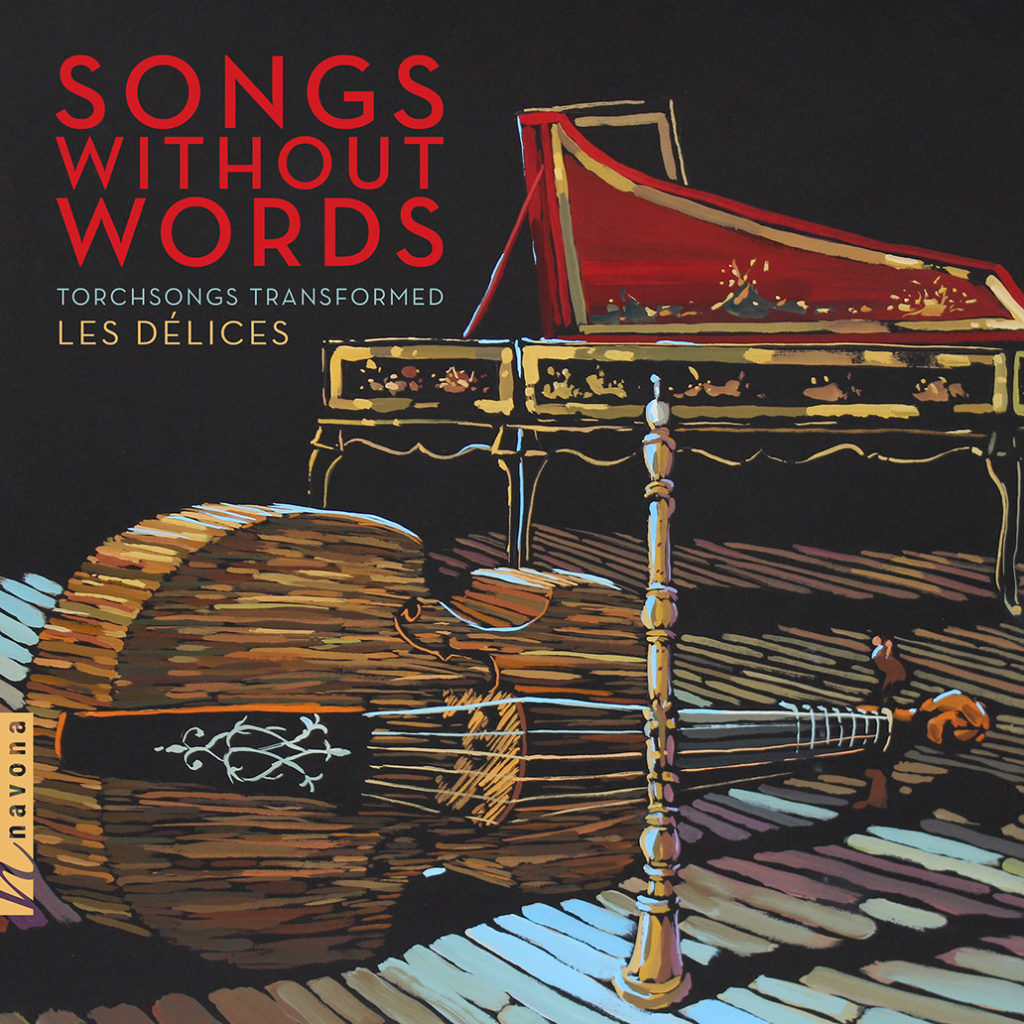by Jarrett Hoffman

First, the adaptation of vocal music from the 17th and 18th centuries for a trio of oboe, viola da gamba, and harpsichord. (That type of process may have occurred between the development of Baroque woodwinds and the publishing of repertoire written explicitly for them.)
Second, the decision to take things a step further, adapting — and improvising over — famous 20th-century jazz and pop songs. Think Michelle by The Beatles, but with a Baroque oboe in place of Paul McCartney.
That might sound like a gimmick to fill out an album, or just weird. Au contraire — the ensemble makes this exploration a central, essential part of Songs Without Words, released last month as part of their 10th-anniversary year. When the dust settles, it’s clear that Les Délices has interwoven pop, jazz, and Baroque music in a coherent, meaningful, and dazzling fashion.
With the “opening set” of jazz-Baroque-jazz, Debra Nagy (Baroque oboe), Mélisande Corriveau (viola da gamba), and Eric Milnes (harpsichord) come out of the gates on a mission to prove that point. A dreaminess and a keen sense of G Major tie together Billy Strayhorn’s A Flower Is A Lovesome Thing, Jean-Baptiste de Bousset’s Pourquoi, Doux Rossignol, and Johnny Mandel’s Emily. The trio performs soulfully, playfully, and brilliantly in both styles, as they do throughout the album — much more on them later.
The streak of curatorial feats continues with Charles Aznavour’s Tomorrow Is My Turn making the perfect, mournful neighbor to Marin Marais’s Prelude in a. And here the project really becomes special. It’s difficult to describe the sense of surprise and pleasure you experience switching back and forth between genres and still feeling entirely at home. It’s like meeting a row of strangers — all ages, from different walks of life — and somehow forming a best-friends club.
The next few selections by Patsy Cline & Willie Nelson and Michel Lambert don’t quite conjure the magical flow we’ve been spoiled to expect thus far. But then comes the highlight of the album — a real classical music SportsCenter moment — when Milnes’ improvised harpsichord bridge takes us thrillingly from the end of Marais’s Folies D’Espagne right into the suavity of Edith Piaf’s La Foule.
Back to the performers, whose emotive playing and unfailing technique are matched by their uncanny sense of ensemble: they sound tied together by mental yarn. But what stands out most is hearing these musicians having so much fun with their craft.
That, combined with the playlist’s makeup of mostly 2-3 minute snapshots, makes it all go by fast. Not so brief at six minutes, that last Marais work still fits right in with its structure of wild variations. Jean-Philippe Rameau’s Tristes Apprêts, on the other hand, grows slightly repetitive over its five minutes.
Fortunately, two more highlights lie on either side of it: another Marais — his deeply poignant Les Voix Humaines — and Lennon & McCartney’s Michelle. In the latter, it’s impressive how comfortably Nagy, Corriveau, and Milnes fill the shoes of their bowl-cutted counterparts, especially Milnes’ playful harpsichord take on the opening guitar line.
Jean-Baptiste Lully’s Récit de la Beauté is one of a couple tracks presenting Corriveau the opportunity to show off another string instrument: the alluring pardessus de viole. The highest member of the viol family, it blends the cutting sound of the violin and the depth of tone of the viola. And being much closer to the oboe in range than the gamba, it makes a fascinating counterpart to the double-reed instrument.
A few tracks later is Autumn Leaves — the perfect ending, of course. This arrangement of the famous Joseph Kosma / Johnny Mercer song features jazzy plucked gamba from Corriveau and stunning, inventive improvisations — half-Baroque, half-jazz — from Nagy. If you only wished for a few more turns at Kosma’s famous tune, well, that’s not a bad way to feel by the end of an album.
Songs Without Words was released on the Navona Records label on November 9. It is available on Spotify, Amazon, iTunes and Apple Music, and Google Play.
Published on ClevelandClassical.com December 11, 2018.
Click here for a printable copy of this article




